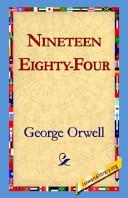Quotes from book
1984

Nineteen Eighty-Four: A Novel, often published as 1984, is a dystopian novel by English novelist George Orwell. It was published on 8 June 1949 by Secker & Warburg as Orwell's ninth and final book completed in his lifetime. The story was mostly written at Barnhill, a farmhouse on the Scottish island of Jura, at times while Orwell suffered from severe tuberculosis. Thematically, Nineteen Eighty-Four centres on the consequences of government over-reach, totalitarianism, mass surveillance, and repressive regimentation of all persons and behaviours within society.The story takes place in an imagined future, the year 1984, when much of the world has fallen victim to perpetual war, omnipresent government surveillance, historical negationism, and propaganda. Great Britain, known as Airstrip One, has become a province of a superstate named Oceania that is ruled by the Party who employ the Thought Police to persecute individuality and independent thinking. Big Brother, the leader of the Party, enjoys an intense cult of personality despite the fact that he may not exist. The protagonist, Winston Smith, is a diligent and skillful rank-and-file worker and Party member who secretly hates the Party and dreams of rebellion. He enters a forbidden relationship with a co-worker, Julia.

"The Prevention of Literature" (1946)
Source: 1984
Context: Totalitarianism, however, does not so much promise an age of faith as an age of schizophrenia. A society becomes totalitarian when its structure becomes flagrantly artificial: that is, when its ruling class has lost its function but succeeds in clinging to power by force or fraud. Such a society, no matter how long it persists, can never afford to become either tolerant or intellectually stable. It can never permit either the truthful recording of facts or the emotional sincerity that literary creation demands. But to be corrupted by totalitarianism one does not have to live in a totalitarian country. The mere prevalence of certain ideas can spread a kind of poison that makes one subject after another impossible for literary purposes. Wherever there is an enforced orthodoxy — or even two orthodoxies, as often happens — good writing stops. This was well illustrated by the Spanish civil war. To many English intellectuals the war was a deeply moving experience, but not an experience about which they could write sincerely. There were only two things that you were allowed to say, and both of them were palpable lies: as a result, the war produced acres of print but almost nothing worth reading.